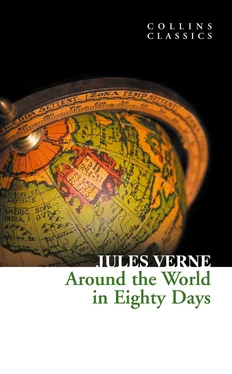“In Asia?”
“Of course.”
“The deuce! What I was going to tell you—there is one thing that bothers me—it is my burner.”
“What burner?”
“My gas-burner, which I forgot to turn off, and which is burning at my expense. Now, I have calculated that it will cost me two shillings each twenty-four hours, exactly sixpence more than I earn, and you understand that, however little our journey may be prolonged—”
Did Fix understand the matter of the gas? It is improbable. He did not listen any longer, and was coming to a determination. The Frenchman and he had arrived at the shop. Fix left his companion there making his purchases, recommending him not to miss the departure of the Mongolia, and he returned in great haste to the Consul’s office. Fix had regained his coolness completely, now he was fully convinced.
“Monsieur,” said he to the Consul, “I have my man. He is passing himself off as an oddity, who wishes to make the tour of the world in eighty days.”
“Then he is a rogue,” replied the Consul, “and he counts on returning to London after having deceived all the police of the two continents.”
“We will see,” replied Fix.
“But are you not mistaken?” asked the Consul once more.
“I am not mistaken.”
“Why, then, has this robber insisted upon having his stopping at Suez confirmed by a visé?”
“Why? I do not know, Consul,” replied the detective; “but listen to me.” And in a few words he related the salient points of his conversation with the servant of the said Fogg.
“Indeed,” said the Consul, “all the presumptions are against this man. And what are you going to do?”
“Send a dispatch to London with the urgent request to send to me at once at Bombay a warrant of arrest, set sail upon the Mongolia, follow my robber to the Indies, and there, on British soil, accost him politely, with the warrant in one hand, and the other hand upon his shoulder.”
Having coolly uttered these words, the detective took leave of the Consul, and repaired to the telegraph office. Thence he dispatched to the Commissioner of the Metropolitan Police, as we have already seen. A quarter of an hour later Fix, with his light baggage in his hand, and besides well supplied with money, went on board the Mongolia, and soon the swift steamer was threading its way under full head of steam on the waters of the Red Sea.
In which the Red Sea and the Indian Ocean show themselves Propitious to Phileas Fogg’s designs
The distance between Suez and Aden is exactly thirteen hundred and ten miles, and the timetable of the company allows its steamer a period of one hundred and thirty-eight hours to make the distance. The Mongolia, whose fires were well kept up, moved along rapidly enough to anticipate her stipulated arrival. Nearly all the passengers who came aboard at Brindisi had India for their destination. Some were going to Bombay, others to Calcutta, but via Bombay, for since a railway crosses the entire breadth of the Indian peninsula, it is no longer necessary to double the island of Ceylon.
Among these passengers of the Mongolia, there were several officials of the Civil Service and army officers of every grade. Of the latter, some belonged to the British Army, properly so-called, the others commanded the native Sepoy troops, all receiving high salaries, since the Government has taken the place of the powers and charge of the old East India Company; sub-lieutenants receiving £280; brigadiers, £2400; and generals, £4000. The emoluments of officials in the Civil Service are still higher: Simple assistants in the first rank get £480; judges, £2400; the president judges, £10,000; governors, £12,000; and the governor-general more than £24,000.
There was good living on board the Mongolia, in this company of officials, to which were added some young Englishmen, who, with a million in their pockets, were going to establish commercial houses abroad. The purser, the confidential man of the company, the equal of the captain on board the ship, did things up elegantly. At the breakfast, at the lunch at two o’clock, at the dinner at half-past five, at the supper at eight o’clock, the tables groaned under the dishes of fresh meat and the relishes, furnished by the refrigerator, and the pantries of the steamer. The ladies, of whom there were a few, changed their toilet twice a day. There was music, and there was dancing also when the sea allowed it.
But the Red Sea is very capricious and too frequently rough, like all long, narrow bodies of water. When the wind blew either from the coast of Asia, or from the coast of Africa, the Mongolia, being very long and sharp built, and struck amidships, rolled fearfully. The ladies then disappeared; the pianos were silent; songs and dances ceased at once. And yet, notwithstanding the squall and the agitated waters, the steamer, driven by its powerful engines, pursued its course without delay to the straits of Bab-el-Mandeb.
What was Phileas Fogg doing all this time? It might be supposed that, always uneasy and anxious, his mind would be occupied with the changes of the wind interfering with the progress of the vessel, the irregular movements of the squall threatening an accident to the engine, and in short, all the possible injuries, which, compelling the Mongolia to put into some port, would have interrupted his journey.
By no means, or, at least, if this gentleman thought of these probabilities, he did not let it appear as if he did. He was the same impassible man, the imperturbable member of the Reform Club, whom no incident or accident could surprise. He did not appear more affected than the ship’s chronometers. He was seldom seen upon the deck. He troubled himself very little about looking at this Red Sea, so fruitful in recollections, the spot where the first historic scenes of mankind were enacted. He did not recognise the curious towns scattered upon its shores, and whose picturesque outlines stood out sometimes against the horizon. He did not even dream of the dangers of the Gulf of Arabia, of which the ancient historians, Strabo, Arrius, Artemidorus, and others, always spoke with dread, and upon which the navigators never ventured in former times without having consecrated their voyage by propitiatory sacrifices.
What was this queer fellow, imprisoned upon the Mongolia, doing? At first he took his four meals a day, the rolling and pitching of the ship not putting out of order his mechanism, so wonderfully organised. Then he played at whist. For he found companions as devoted to it as himself: a collector of taxes, who was going to his post at Goa; a minister, the Rev. Decimus Smith, returning to Bombay; and a brigadier-general of the British Army, who was rejoining his corps at Benares. These three passengers had the same passion for whist as Mr Fogg, and they played for entire hours, not less quietly than he.
As for Passepartout, sea-sickness had taken no hold on him. He occupied a forward cabin, and ate conscientiously. It must be said that the voyage made under these circumstances was decidedly not unpleasant to him. He rather liked his share of it. Well fed and well lodged, he was seeing the country, and besides, he asserted to himself that all this whim would end at Bombay. The next day after leaving Suez it was not without a certain pleasure that he met on deck the obliging person whom he had addressed on landing in Egypt.
“I am not mistaken,” he said on approaching him with his most amiable smile; “you are the very gentleman that so kindly served as my guide in Suez?”
“Indeed,” replied the detective, “I recognise you! You are the servant of that odd Englishman—”
“Just so, Monsieur—?”
Читать дальше












